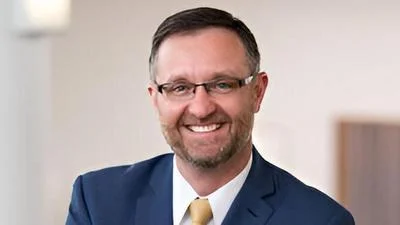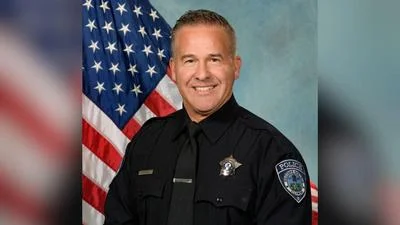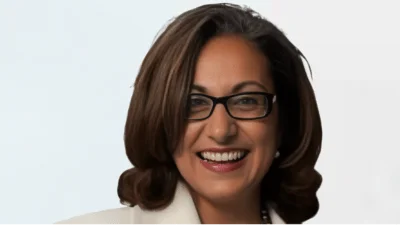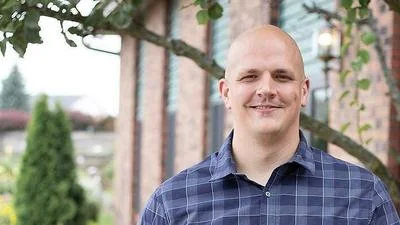Terry Newsome on the set of the Behind Enemy Lines podcast. | Facebook / Behind Enemy Lines
Terry Newsome on the set of the Behind Enemy Lines podcast. | Facebook / Behind Enemy Lines
Terry Newsome, a GOP precinct committeeman, host of the Behind Enemy Lines podcast, and leader of Illinois Parents Involved in Education, is the latest Illinois conservative alleging that Facebook is censoring his posts—despite Meta CEO Mark Zuckerberg’s January pledge to end the platform’s U.S. fact-checking program and turn content oversight over to users.
Supporters argue that Newsome’s experience follows a pattern of silencing Republican voices statewide, reinforcing accusations that Big Tech unfairly targets conservative content.
Newsome, who has been repeatedly suspended by Facebook in recent months, says the content bans are politically motivated and lack any transparency.
“My [Facebook] account was suspended three times in nine days,” Newsome told the DuPage Policy Journal in a recent interview. “I won two of three appeals.”
According to Newsome, the suspensions came without warning or standard enforcement protocols.
“I didn't even have strikes—like usually you get one day, then two days, a weekend, a week. I didn’t even get close to that,” Newsome said.
Despite successfully appealing two of the three suspensions, Newsome says the process left him feeling targeted and confused.
Newsome said his removal followed an ongoing, online debate with two Republican candidates—gubernatorial hopeful Joe Severino and former 9th District congressional candidate Max Rice—who he believes targeted his accounts for takedown.
“I mean, I'm telling you, I didn't do anything wrong,” he said. “They whacked me twice, and I appealed twice, and then they came back on. So I'm wondering if they do these mass appeals to other followers.”
The broader consequences of Newsome’s de-platforming have been substantial. He lost access to multiple Facebook pages critical to his political organizing, including those for his Behind Enemy Lines podcast and the Save IL Coalition, a bipartisan group leading an effort to place two non-binding questions on the 2026 ballot. One asks whether Illinois should continue following the TRUST Act, which limits local cooperation with federal immigration authorities and the other asks whether Chicago should keep using taxpayer funds for illegal immigrants.
Across his accounts and pages, Newsome estimates he lost access to a network of more than 6,000 followers.
His experience contrasts sharply Zuckerberg’s January 2025 announcement that Facebook would end its U.S. fact-checking program. Zuckerberg also acknowledged that external pressure had influenced content moderation and admitted the fact-checking process had become biased, particularly against conservatives.
House Judiciary Chair Jim Jordan (R-Ohio) praised the move as a win for free speech, crediting his committee’s investigations for exposing Facebook’s coordination with the Biden administration and FBI to suppress certain narratives, including the Hunter Biden laptop story and COVID-19 information.
Subsequently, Jordan urged other tech companies, especially Google, to follow Meta’s lead in resisting government influence.
As the 2025 election season ramps up and lawmakers explore potential regulation, critics say more must be done to restore trust, transparency and political neutrality to the digital public square.
These experiences reflect broader concerns raised by former Republican National Committeeman Richard Porter, who argues that Facebook’s vague community standards and opaque enforcement allow bad actors—both individuals and corporations—to exploit the platform to silence dissent.
“If there is a post that they feel violates their community standards, whatever they may be—they're sort of vague and it's not really clear what they are–then that post itself should be removed instead of the entire account being shut down,” Porter told Chicago City Wire. “There's this collateral effect that arises from their failure to be targeted about it.”
Porter believes that social media companies have not followed through on their promises of reform, particularly regarding user transparency and content moderation.
“You don't even know who it is,” he said. “So you're like ‘who is the party that's really making that happen?’ There's no transparency towards that either. It's like, what are their standards and who is it that's trying to silence that website?”
He warns that the lack of clear boundaries around speech, the unchecked use of AI in content moderation, and growing privacy concerns are combining to create a dangerous digital environment.
"There are a lot of bad things happening, and we need to figure out what our expectations are,” he said. “First, with regard to the scope of free speech and regulation of speech, what’s appropriate and inappropriate? When do we know what the bounds are? Next is how AI will, as an overlay, affect the creation and regulation of content. And finally, and I think most importantly, privacy — what will be the impact on private information, its accessibility, dissemination, and so forth."
Porter and others say the digital space has become a political battleground, where social media platforms serve as tools for silencing opposition, intentionally or not.
There are more examples of GOP voices, like Newsome's, in the Illinois conservative community who have been removed from Facebook.
The Facebook account for Molly Krempski, Vice President of the U.S. Patriots Society’s Kendall County Chapter, was permanently banned just days before the April 2025 Illinois election.
“I believe social media was intended to be used to track, oppress, and indoctrinate us, but God has instead used it to expose the wickedness of the king and kingdom of this world,” Krempski previously told the Kendall County Reporter.
Similar concerns arose in 2023 when Heather Brown, then a State Senate candidate and West Chicago alderman, had a 9/11 memorial post removed and her account restricted for 90 days during campaign season.






 Alerts Sign-up
Alerts Sign-up